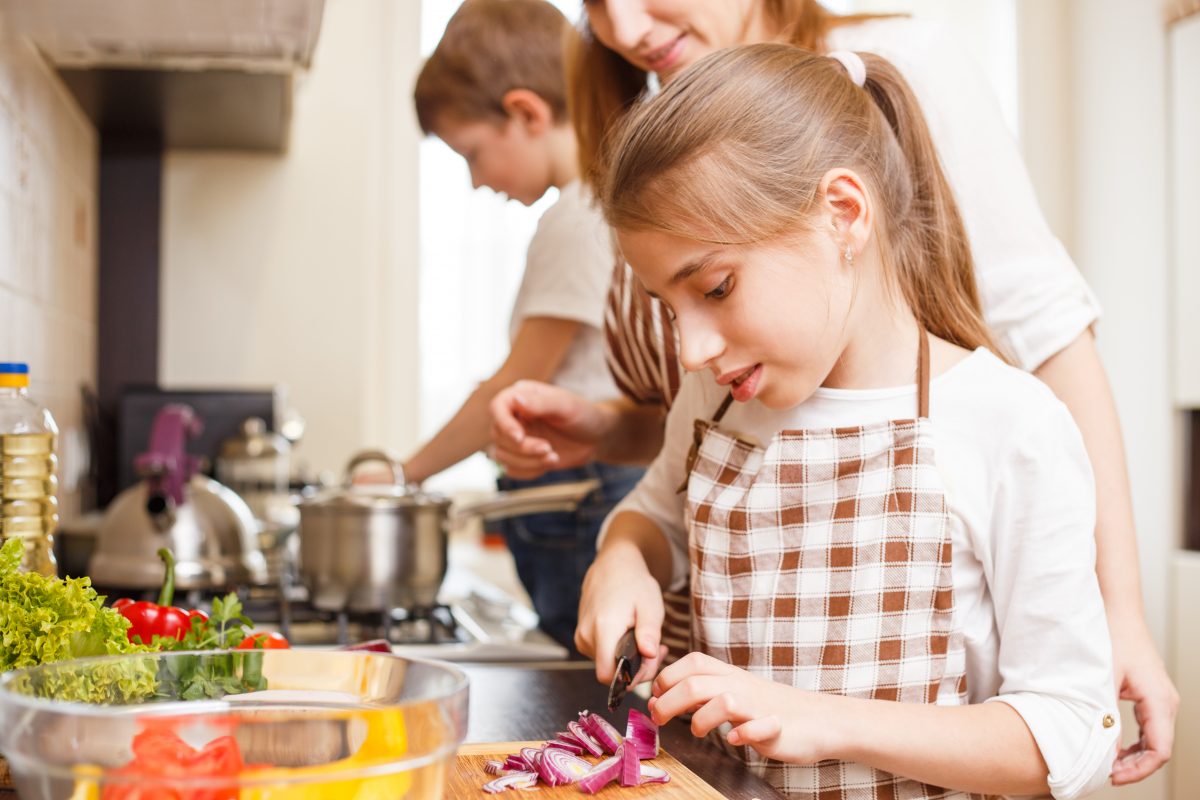There are two important factors to consider when deciding which tasks your child is able to perform in the kitchen: their physical ability to do the task, and their mental ability to comprehend the task and, in particular, the possible dangers involved.
Young children will not have the strength to lift pots and pans or to cut through dense foods like potatoes, but they also may not know that hot foods can burn them or that knives are dangerous. Younger kids also may have trouble remembering a series of steps that need to be followed, so you can help them by breaking down a task step by step as they go along. They definitely need to show that they can follow directions before you let them handle dangerous equipment.
You know your child better than anyone, but here are some tips for helping them get acquainted with the kitchen so that they can become proficient. It is important that your kids master each level before going on to more technical cooking activities.
The Youngest Cooks
Your eighteen-month-old probably wants to be a part of whatever you are doing in the kitchen—until they find the next thing to do. Children at this age obviously need the most supervision, since their motor skills are not yet highly developed
and they have short attention spans.
Your child is never too young to learn the importance of cleanliness. Make this ongoing task a part of the cooking experience now and you will have cleanliness in the kitchen in the future. Hand washing and avoiding cross-contamination are important for even the youngest cooks to learn about. (Granted, cross-contamination is not as big a problem in the plant-based kitchen as it is in kitchens with meat or other animal products, but it is a good habit just the same.)
Children as young as eighteen months can do the simplest of tasks. They need supervision and may show interest for only a few minutes at a time, but let them do what they will even if it does not contribute in any but the smallest way to the task at hand. My friend’s daughter used to come to my bakery regularly with her parents. Even before she was able to walk, I would give her a piece of bread dough to play with. Every time she came into my bakery she would want something to play with. As she got older, she would help her mom in the kitchen, setting the table, removing dirty dishes from the table, stirring cake batter, or adding a premeasured ingredient to a bowl. When she was a teenager, I hired her to help me with catering events, and to this day she still helps her mom in the kitchen when she comes home from school.
3- to 5-Year-Old Cooks
Kids at this age are able to understand directions better and can help with more specific tasks such as measuring ingredients, chopping herbs with a butter knife, mashing potatoes, whisking salad dressing, or putting salad greens into a serving
bowl.
Show children the difference between wet and dry measuring cups, how to level dry ingredients using the straight edge of a knife, and how to measure liquid ingredients to the line indicating the desired quantity called for in the recipe.
Kids at this age are too young for even basic math, but they can certainly count out items with you.
5- to 7-Year-Old Cooks
School-age children can engage in more technical activities and use more sophisticated equipment. They can handle measuring, mixing, pouring, grating, and peeling, as well as setting the table. They still need constant supervision, but you may let them use a sharp knife—keeping in mind that the size of the knife should be appropriate for the child’s hand and ability to manage it.
Adults should advise younger children that hot foods can cause serious burns, especially because young kids may have even more sensitive skin and mouths than adults.
8- to 11-Year-Old Cooks
Kids at this age can follow simple, straightforward recipes, plan menus and meals, and begin to work with the stove or oven. Use this time to teach them about the dangers of equipment and utensils. Talk to them about taking their time, doing one activity at a time, and using gloves to handle hot items (you may need to buy them their own in a size that fits their smaller hands).
This age group can probably handle a can opener. Show them how to do it on a stable surface. They can also learn about cooking times, cooking temperatures, and testing for doneness in baked goods. They can practice their math skill to double or halve ingredient quantities.
12+-Year-Old Cooks
Older children can start to improvise and prepare more complex recipes, often unsupervised. Kids who exhibit good kitchen safety skills, as described in the next section, can even use equipment like blenders and food processors.

